Forging a united Sri Lanka: Pillars of strength for a prosperous future
By Dr. Ravinthirakumaran Navaratnam
Introduction
Sri Lanka’s strength lies in unity, making social and political cohesion vital for stability and progress. Sustainable unity is built on six pillars: racial and religious harmony, uplifting lower-income communities, strengthening national identity, building political consensus, enhancing the legal framework, and nurturing new leadership. Prioritizing these aspects will help bridge divides, foster trust, and ensure resilience.
For decades, instability has hindered Sri Lanka’s development. As a strategically significant nation, it must remain vigilant, learning from its South Asian neighbours. Countries like India and Pakistan struggle with internal tensions, economic challenges, and security threats, while Nepal’s political instability affects investor confidence. These issues contribute to South Asia’s negative economic perception.
Meanwhile, China has emerged as a regional powerhouse, leveraging economic growth, modern infrastructure, and global trade influence. Despite regional uncertainty, Sri Lanka aims to become a service hub and attract multinational corporations. Although challenges persist, the country can restore stability through economic reforms and strengthened regional ties. A shared vision and commitment to socio-economic progress are essential for Sri Lanka’s success. By focusing on six critical pillars, the nation can navigate challenges, attract investment, and build a unified, prosperous future.
Promoting Racial and Religious Harmony in Sri Lanka
Sri Lanka is a multi-ethnic and multi-religious nation where Sinhalese, Tamils, Muslims, and Christians coexist. Religion plays a significant role in shaping cultural traditions and moral values, influencing daily life and social interactions. Despite centuries of coexistence, Sri Lanka has experienced ethnic and religious conflicts, including the 1958 and 1983 anti-Tamil riots, the 26-year civil war, and recent events such as the 2018 anti-Muslim riots and the 2019 Easter Sunday attacks. Strengthening racial and religious harmony is essential for national unity, long-term peace, and economic development.
Post-war reconciliation efforts have introduced several initiatives to foster inter-community relations. The Lessons Learnt and Reconciliation Commission (LLRC) was established in 2009 to address ethnic grievances, while organizations like the National Peace Council and the Inter Religious Council promote interfaith dialogue among Buddhist monks, Hindu priests, Muslim imams, and Christian clergy. Institutions such as the Human Rights Commission of Sri Lanka monitor religious discrimination, while international organizations like UNESCO support community-building projects.
Additionally, laws against hate speech, trilingual education reforms, and cultural festivals celebrating Sri Lanka’s diversity contribute to social cohesion. However, continuous efforts are required to ensure inclusivity and prevent divisions.
Education is a key tool in promoting religious tolerance. Schools should incorporate lessons on Sri Lanka’s religious diversity, and cultural exchange programs can encourage inter-community understanding. The government must ensure legal protections against hate speech and discrimination while addressing economic disparities that contribute to tensions. The media also plays a crucial role in preventing misinformation that fuels divisions. Religious leaders must actively discourage extremism and promote interfaith dialogue through joint initiatives. Learning from successful multicultural models like Singapore, Sri Lanka can strengthen community engagement, eliminate discrimination, and foster an inclusive society where diversity is celebrated, ensuring long-term peace and stability.
Supporting Lower-Income Groups in Sri Lanka
Ensuring that all Sri Lankans benefit from economic growth is crucial for sustainable development. Poverty and income inequality are significant challenges in Sri Lanka, with 25.9% of the population living below the poverty line in 2023, up from 14.3% in 2019. Income inequality is also a major issue, with the richest 20% receiving more than half of the total income, while the poorest 20% only receive 5%. The gap between high and low-income earners continues to widen, creating economic and social challenges. The rural poor, particularly farmers and estate sector workers, are especially affected. They face low productivity, limited access to modern technology, and poor wages. Urban poverty is also growing, especially in cities like Colombo, due to rising living costs and housing shortages. Addressing the needs of lower-income groups can help foster unity and reduce social divides.
Education is key to improving economic conditions. Although Sri Lanka has a high literacy rate, disparities exist between urban and rural schools. To ensure equal opportunities, investment in quality education, vocational training, and skill development is necessary. Programs like microfinance and entrepreneurship grants can also support small businesses, particularly among women and youth. Access to healthcare remains a challenge, especially in rural areas, despite free public healthcare. Social welfare programs, like Samurdhi and Aswesuma, provide financial aid to low-income families, but they require reform to improve efficiency. Redirecting military funds to social development programs can further support these efforts.
A culture of philanthropy and corporate social responsibility among the wealthy is essential to create a more inclusive society. Through comprehensive policy reforms and social support, Sri Lanka can achieve a more equitable society where everyone has the opportunity to thrive.
Rooting Sri Lankans to Sri Lanka
Sri Lanka is facing a significant "brain drain," as skilled professionals, students, and youth increasingly migrate abroad in search of better economic opportunities, safety, and higher education. The migration trend has intensified following the 2019 Easter Sunday attacks and the 2022 economic crisis, with over 300,000 Sri Lankans leaving the country in 2022 alone. This has potential long-term consequences for the country’s workforce, economic competitiveness, and innovation.
To address this, Sri Lanka must focus on expanding economic opportunities, attracting foreign investments, and fostering entrepreneurship. Sectors such as technology, tourism, and manufacturing have significant potential to create high-quality jobs. Strengthening local universities, increasing research funding, and fostering innovation can also retain students who typically pursue higher education abroad. Collaborations with global institutions can provide international exposure without requiring permanent relocation.
Patriotism and national identity play key roles in encouraging people to stay or return. Promoting Sri Lanka’s rich cultural heritage, celebrating national achievements, and strengthening civic education can help foster a sense of belonging. Additionally, infrastructure development, such as modern transport, healthcare, and digital connectivity, can improve living conditions, reducing the need for migration. Leveraging the Sri Lankan diaspora is another strategy. Over 3 million Sri Lankans live abroad and can contribute to national development through investments and business partnerships. Creating opportunities for diaspora engagement through incentives and dual citizenship policies can help strengthen ties.
Ultimately, a comprehensive approach, focusing on economic, educational, social, and infrastructural improvements, can encourage Sri Lankans to stay, return, or remain actively engaged with their homeland, ensuring long-term prosperity.
Fostering Political Consensus in Sri Lanka
Fostering political consensus is crucial for Sri Lanka's stability and long-term development, but the country faces deep-rooted political divisions. Intense rivalry between major parties, frequent shifts in alliances, and inconsistent policies have hindered governance and economic progress. The adversarial nature of Sri Lankan politics, particularly between parties like the SLFP, UNP, SLPP, and SJB, often leads to prioritizing party loyalty over national interest, resulting in policy reversals and uncertainty for investors.
Constitutional amendments have further complicated governance, as changes often serve political interests rather than national stability. For example, the 20th and 21st Amendments altered the executive presidency and parliamentary powers, highlighting the difficulty in establishing long-term governance structures. A bipartisan approach to constitutional reforms could help stabilize governance. Economic management also requires political consensus, as seen during the 2022 economic crisis, partly caused by poor fiscal policies. A unified economic policy framework across political parties would ensure continuity in fiscal discipline and improve investor confidence. Ethnic reconciliation remains a divisive issue, with differing views on minority rights and power devolution. Engaging in genuine political dialogue involving all stakeholders could help address these grievances.
Electoral reforms are needed to address Sri Lanka's fragmented politics, and a mixed electoral system could improve government stability. Strengthening public participation in governance and empowering independent commissions, like the Election and Human Rights Commissions, is essential for impartiality. Political leaders must commit to dialogue and compromise, creating platforms for inter-party discussions, similar to successful coalition governments in other countries. By fostering dialogue, long-term policy frameworks, and prioritizing national unity, Sri Lanka can build political consensus, ensuring stable governance and sustainable development.
Nurturing new leadership in Sri Lanka
Sri Lanka's future depends on nurturing a new generation of leaders to drive national progress. For years, the political landscape has been dominated by a few elite families, resulting in stagnation, corruption, and a lack of fresh ideas. To address this, new leaders across politics, business, and other sectors are necessary for good governance and development.
A key challenge is the concentration of power in dynastic politics, limiting diversity and innovation. Encouraging young politicians from diverse backgrounds, such as professionals and grassroots activists, can bring fresh perspectives. Education plays a crucial role, with leadership training in schools and universities needed to develop critical thinking and problem-solving skills. Mentorship programs can help guide young individuals into leadership roles.
Political reforms are also essential, as the current system often favors established figures. Campaign finance regulations and promoting intra-party democracy could provide opportunities for young, qualified candidates. Gender equality in leadership is also vital, as women remain underrepresented in politics and business.
The private sector and civil society must also contribute to leadership development. Platforms like innovation hubs and youth forums can foster cross-sector collaboration and problem-solving. Digital platforms offer new opportunities for young people to engage in political discussions and social movements.
To ensure a smooth leadership transition, senior leaders must mentor successors. Structured mentorship programs within political parties and businesses can prepare the next generation. Integrity and accountability must be prioritized, with strong anti-corruption measures and transparent governance.
By investing in education, political reforms, mentorship, and ethical leadership, Sri Lanka can produce capable leaders who will drive sustainable progress.
Enhancing Legal Framework in Sri Lanka
A strong legal framework is crucial for Sri Lanka’s stability and progress, promoting justice, equality, and transparency. A fair legal system ensures that all citizens, regardless of ethnicity, religion, or socio-economic background, are treated equally and have their rights protected. Strengthening Sri Lanka's legal system involves addressing issues such as inequality, human rights abuses, and corruption. Legal reforms aimed at these issues will improve the judicial system and boost public trust in the government’s ability to enforce laws impartially.
Promoting equal rights and fair treatment fosters an inclusive society, especially in Sri Lanka’s diverse context, where ethnic tensions have historically caused divisions. A robust legal system will protect minority rights, prevent discrimination, and promote social harmony. Transparency and accountability within the legal system are also essential for reducing corruption and ensuring fair governance. Legal reforms that enhance accountability will hold public officials responsible for their actions and increase citizens' confidence in the legal process.
Ultimately, strengthening Sri Lanka's legal framework will create a society based on justice, equality, and respect for human rights. This will contribute to long-term national stability, foster social cohesion, and ensure a brighter future for all citizens.
Conclusion
A united Sri Lanka is the foundation for lasting peace, stability, and progress. By fostering racial and religious harmony, uplifting marginalized communities, strengthening national identity, building political consensus, enhancing legal framework and nurturing new leadership, the country can move towards a more inclusive and prosperous future. True cohesion is not just about coexistence but about collective growth and mutual respect. When these pillars are strengthened, Sri Lanka can harness its diversity as a source of strength, ensuring a thriving nation for generations to come. Now is the time to embrace unity and work together to build a brighter tomorrow.
(The writer is a Senior Lecturer in Business Economics and the Department of Business Economics, University of Vavuniya. He can be contacted via: navaraviecon@vau.ac.lk)
-
Still No Comments Posted.



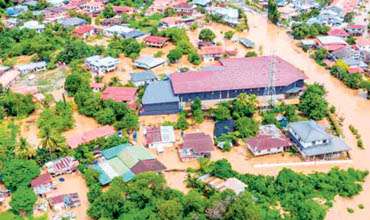

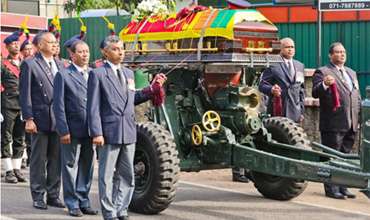
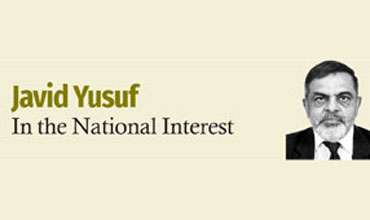
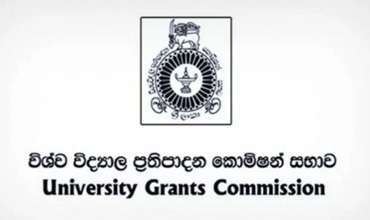
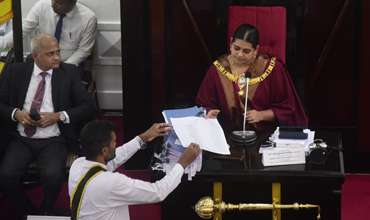
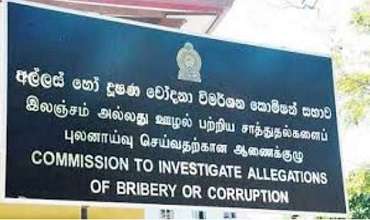
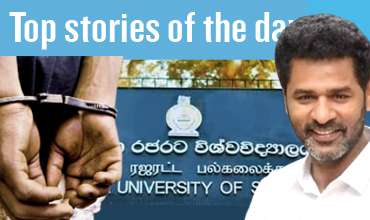



Leave Comments